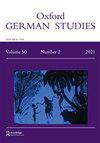这对《波尔电影(2010)》和德语历史来说是一个艰难的遗留问题
IF 0.1
3区 文学
0 LITERATURE, GERMAN, DUTCH, SCANDINAVIAN
引用次数: 0
摘要
克里斯·克劳斯(Chris Kraus) 2010年拍摄的德国-奥地利-爱沙尼亚故事片《民意调查》(Poll)以1914年为背景,发生在爱沙尼亚的民意调查(Põlula),描绘了战前德国波罗的海人、爱沙尼亚人和俄罗斯人之间的紧张关系。它大致是根据作家Oda Schaefer(1900-1988)的自传改编的。它还追求决定论与自由的关系。海上的一座吊脚楼象征着德国对波罗的海的不稳定统治,夹在德国的特权、俄罗斯的军事力量和爱沙尼亚的叛乱和自决要求之间。本文章由计算机程序翻译,如有差异,请以英文原文为准。
Ein schwieriges Erbe — der Film Poll (2010) und die deutschbaltische Geschichte
The German-Austrian-Estonian feature film Poll by Chris Kraus from 2010 is set in the year 1914 on the Estonian estate Poll (Põlula) and depicts the pre-war tensions between German Balts, Estonians and Russians. It is loosely based on the autobiography of the writer Oda Schaefer (1900–1988). It also pursues the relation between determinism and freedom. A stilted construction in the sea symbolizes the precarious German-Baltic domination caught between German privileges, Russian military power and Estonian insurrection and demands for self-determination.
求助全文
通过发布文献求助,成功后即可免费获取论文全文。
去求助
来源期刊

OXFORD GERMAN STUDIES
LITERATURE, GERMAN, DUTCH, SCANDINAVIAN-
CiteScore
0.10
自引率
50.00%
发文量
2
期刊介绍:
Oxford German Studies is a fully refereed journal, and publishes in English and German, aiming to present contributions from all countries and to represent as wide a range of topics and approaches throughout German studies as can be achieved. The thematic coverage of the journal continues to be based on an inclusive conception of German studies, centred on the study of German literature from the Middle Ages to the present, but extending a warm welcome to interdisciplinary and comparative topics, and to contributions from neighbouring areas such as language study and linguistics, history, philosophy, sociology, music, and art history. The editors are literary scholars, but seek advice from specialists in other areas as appropriate.
 求助内容:
求助内容: 应助结果提醒方式:
应助结果提醒方式:


